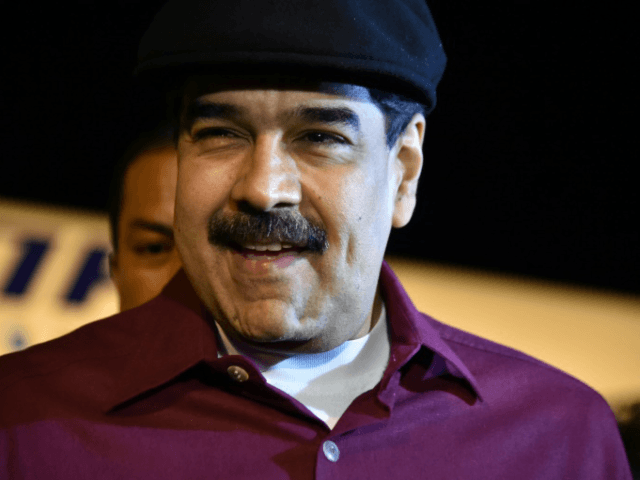Venezuela’s dictator Nicolás Maduro will visit Turkish counterpart Recep Tayyip Erdogan on Thursday and Friday, attending a meeting of the Turkey-Venezuela Business Forum shortly after reportedly seeking to restructure billions in Russian debt held by his failed state.
Venezuelan socialist state media has dubbed Maduro’s travels the “Bolivarian Peace Diplomacy Tour,” and notes Maduro has already visited Belarus and Algeria in addition to Russia. During his visit with President Vladimir Putin this week, Maduro reportedly requested “restructuring Russian loans to Venezuela, believed to total £4.5 billion.” While Venezuela boasts the world’s largest known oil reserves, nearly two decades of socialist mismanagement have left the economy in ruins, with the average Venezuelan unable to secure three meals a day and the near complete absence of basic medical supplies in most hospitals.
“I thank you for all the support, political and diplomatic, in difficult times which we are living through,” Maduro told Putin in Moscow.
The Turkish newspaper Hurriyet reports that Maduro and Erdogan are expected to “discuss regional and international issues and exchange views,” according to the Turkish government. Maduro will also attend a “Turkey-Venezuela Business Forum meeting to be organized by the Union of Chambers and Commodity Exchanges of Turkey (TOBB)” during his visit. Hurriyet does not provide details as to what sort of business investments Maduro will promote, though heavy crude is Venezuela’s most coveted export.
Venezuelan state news outlet VTV quotes Maduro as stating that he is seeking closer ties to Turkey because “Turkey is one of the emerging nations of the 21st Century, a powerful country with a long history with which we have been exploring, working, and creating new forms of cooperation.”
Maduro stated as his goal in the visit is to “open the paths to Venezuela with relations of respect, equality, and opening fields of cooperation necessary for our beloved country.”
Maduro most recently met with Erdogan in September, along with Iranian president Hassan Rouhani, while attending a meeting of the Organization of Islamic Cooperation (OIC) in Kazakhstan. According to VTV, Venezuela “has obtained over $500 million in exports to Turkey,” mostly in oil, iron, wood, and petrochemicals. Both Rouhani, whose nation has long held ties to the Venezuelan socialist regime, and Erdogan expressed support for Venezuela during that meeting in the face of mounting economic sanctions imposed by the United States.
While the ties between Venezuela and Iran extend back to a strong friendship between former Iranian president Mahmoud Ahmadinejad and late dictator Hugo Chávez, Erdogan’s open support for the Venezuelan regime is a relatively recent development. Erdogan has been attempting to establish a stronghold in Latin America for Turkish business and diplomacy for years, asserting that Muslims—not the Spanish crown—discovered America and using that as a justification for attempting to fund the construction of a mosque in Cuba. The communist Castro regime, while largely controls Venezuela, rejected Erdogan’s plan to establish a mosque; Havana’s regime is atheist and regularly cracks down on free religious expression.
Now Erdogan appears to be attempting to strengthen ties with Venezuela, despite the deep ties between Caracas and Shiite terrorist group Hezbollah, the Alawite Shiite dictator Bashar al-Assad, and the Iranian regime. Nearly a year ago, Erdogan issued a statement following a call with Maduro in which he supported the Venezuelan regime against what he described as “violent attempts to destabilize” the nation, despite rampant state violence against unarmed, pro-democracy protesters. Erdogan called for new dialogue between the regime and the opposition despite the failure of the latest round of talks, which significantly hampered the protest movement while emboldening state violence against protesters.

COMMENTS
Please let us know if you're having issues with commenting.